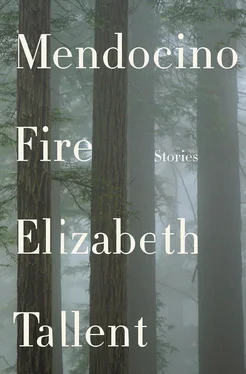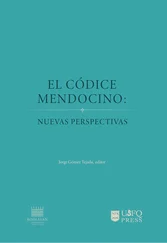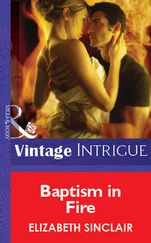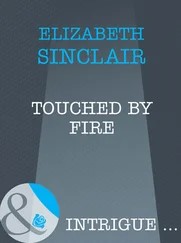“My godchildren.” Each morning, with her first cup of coffee, she stands before the collage of fat-cheeked faces, snowsuits and tutus, trying to make sure she’s not forgetting another birthday.
“All girls?”
“In China girls get abandoned so the parents can try for a boy.”
“Do you like kids?”
“Only those.”
“I can’t imagine what it would feel like, abandoning your baby.” She imagines: “Like tearing your heart out with your bare hands.” She taps several pictures. “These are cute, these tiny violins.”
“Suzuki method.”
“I want kids.”
“Why don’t you get out the wine? But let me pour.”
“Ha.”
Bringing two wineglasses filled to the brim, she sets one down by Clio and sits in the nearer of two cubes of chrome and black leather.
Clio says, “I’ll make a fire. Get you warmed up.” Thinks
Dolt!
for the double entendre. She busies herself with crumpling newspaper and arranging kindling into a tipsy pyramid — reminded, as the lit match wavers, of Renee — and she’s in luck, the fire catches nicely, and Nadia comes to sit cross-legged beside her, the bath towel now slung over her shoulders boxer-style. She rubs the back of a freckled hand across her cheekbone, leaving a streak of wet grittiness. Clio looks away so she won’t be tempted to take the towel’s corner and erase that streak. She doesn’t want to ask if she can, but simply for things to unfold,
or not, as Nadia wishes. Nadia hugs her shins, fire-gazing, and says, “I was crazy, out there in the rain. You came along and saved me.” In her voice, the definite note of flirtation.
“I want something for you.”
“Something
for
me? What?”
“You might not understand this, or think it has anything to do with me — and probably it doesn’t — but what I want is your happiness. However you want to go about obtaining it. Whatever shape it takes in your imagination. The funny thing is, I can want this without knowing the specifics. How you’d define happiness. Whether you even think it exists.”
“What about your happiness?” Nadia says. “You know, supposing something happened with us. Would you be all right if it happened only once?” So, when it comes down to it, she’s a person who likes to know what she’s getting into. Clio had believed, wrongly, that she would prefer not-knowing, risk, improvisation.
“I don’t know.” She rues her honesty. “Yes.”
“You would? Even if we can’t see each other after this?”
“Yes.”
“Because this can’t turn into a
thing
.” Nadia sticks to interrogation: reluctantly, Clio realizes she might be good at it. “I don’t want you to get hurt, do you see that?”
“I’m fine.”
“Because I’m straight.”
“The essence is that I love you,” Clio says, “that I loved you the moment I saw you,” and then she says, “and that’s never happened to me before,” and hugs her own shins, the two of them fire-gazing in parallel universes, waiting for what will come next.
Q: Tell me.
A: The Beloved’s nipples are terra cotta, her vagina is coral, her hair, floating as it dries, a torrent freed from gravity, roams the air around her face with an unruly will of its own, her high forehead serene in spite of this changeling hair, her small breasts swinging and bumping her whippet rib cage, the mole on her neck vivid, her kneecaps flushed bright pink by the fire’s heat as she crouches above Clio, and if Clio wants to believe this night the most beautiful she will ever live through, who can disagree? All conspires to ensure the Beloved’s tenure, Clio’s argument (“The last male this department gave tenure to had only one — uninteresting, I think — book and a couple of derivative articles”), the yes Clio scrawls on a slip of paper, one of several dozen slips collected by the chair, doubly, triply inevitable. Let’s agree that no love should be judged by its duration, and that what Clio learned that isolated night, never before having experienced its like, is of incalculable worth in what Keats calls the school for souls. But there is another vantage point, the future, which finds Clio dreaming she’s lost something and can’t regain it, no matter how she searches. She wakes to find she has bitten her lip until it bleeds. Spots of blood dapple the pillow slip, and when, later that day, Clio discovers the wedding invitation lurking in her departmental mailbox, she tears it to pieces, only to end up taping them together and magnetting the frankenstein card among her goddaughters. Nadia’s bridegroom is composedly handsome in his tux — maybe there is, in fact, a slight fussiness in the shine of his shoes and the primly satisfied set of his mouth; of the two of them, bride and groom, his is the more conventional prettiness. After a boomingly musical interval, all heads turn to follow the bride’s progress down the aisle, getting farther and farther away, and the only thing Clio wants to do, there in her pew, is claw at her arms, bare for the beautiful May weather, to smear ashes across her face, to maul and mark her body forever, but a hand clasps hers. This clasp conveys restraint, forbearance, calm. It’s Renee’s hand, for not long after Clio sat down, Renee slid into the pew beside her, craning her neck to take in the fanciness of the flowers at the altar, concluding, “Swanky.” Then, in a whisper: “Mimosa. Unusual choice.”
The two trees in Clio’s yard prove to be not plum but cherry, merely ravishing. Even the inexhaustible Woolf, in the following days and weeks, holds no fascination for Clio. Much, much later it will occur to Clio that though the box seemed to her to possess sufficient weight, and seemed to hold something both lolling and stiff, she had never actually seen the cat. The lid had been taped down, the box wound around and around again with duct tape. Did Nadia, unaware her conniving was redundant, scheme for Clio’s
yes
? If it wasn’t the cat in the box, what else can it have been? Something with the density of the once-alive, with a certain compactness, the weight of dark muscle — say, Clio’s heart. It might as well have been her heart, she parted with it so completely that night, and it’s so long — so bitterly long — before she sees
that
again.
Q: Does she ever see it again?
A: Sweet Questioner, you care. If we skip ahead to the morning two years later when, rolling over in bed, lifting herself on an elbow to gaze down her pugilist’s nose at Clio, Renee reels off the ingredients for her fawn skin, handsome mouth, and eerie green eyes — African American, Lakota Sioux, Welsh, some Norwegian — we can call that the moment Clio sees it again. And, look, beyond the ken of this exam they never run out of things to say to each other, though one spends her days leafing through old books, the other up to her elbows in sweet peas and tuberose, cattleya and quince.
Q: Read the following quotation from Simone Weil’s “On Human Personality.”
If a child is doing a sum and does it wrong, this mistake bears the stamp of his personality. If he does the sum exactly right, his personality does not enter into it at all.
Argue that this does, or does not, have implications for love.
Only a divorce but she can barely get out of bed, she needs a cocoon or echoless cave, the phone rings on and on despairing, every clock in the twilit house ticks further into the future.
You’re a survivor.
It disturbs her to be called survivor when she knows she is not — not in the sense that’s intended, of belonging to a superior, blessedly resourceful class of human being. When she lived through the experience, she had been a child, and that is what children do, they live through things if they can. In that sense, survivor is like breather . Breathing is what every child does and keeps doing until some force or other rules out breathing. Which is all that survivor amounts to, too.
Читать дальше












